Short Stories Of Akbar And Birbal In English With Dialogues have fascinated generations, offering a blend of wit, wisdom, and humour. Emperor Akbar, known for his justice and curiosity, often relied on his clever advisor, Birbal, to solve the most challenging riddles and disputes in his court. These stories, rich with moral lessons, not only entertained but also educated listeners, young and old alike.
In this article, you will find five Famous Stories Of Akbar And Birbal, each accompanied by a valuable moral lesson. These Humorous Stories Of Akbar And Birbal With Moral are perfect for teaching children important virtues such as honesty, wisdom, and kindness in an engaging and memorable way. So, dive into these enchanting stories and discover the timeless wisdom of Akbar and Birbal, which you can share with the kids to impart meaningful life lessons. Related: 12 Best Short Stories With Morals In English For Kids
5 Famous Stories of Akbar and Birbal With Moral For Kids
The Short Stories Of Akbar And Birbal In English have captivated audiences for centuries. Originating from the Mughal era, these Akbar And Birbal Funny Stories highlight the cleverness of Birbal and the diverse challenges he faced in the royal court. Birbal’s quick wit, humour, and wisdom shine through in each narrative, making them more than just entertaining tales.
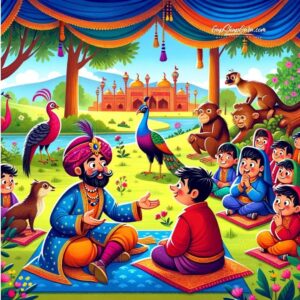
They are a medium through which children can learn about problem-solving, moral values, and the importance of intelligence and humour. The dialogues between Akbar and Birbal are particularly engaging, often leading to surprising and thought-provoking conclusions. As we delve into these Akbar Birbal Stories In English With Dialogues, we find a world where wit triumphs over complexity, making these stories a cherished part of Indian heritage. Related: 25 Panchatantra Short Stories With Moral For Kids In English
Akbar And Birbal Crow Story
One sunny day in the grand court of Emperor Akbar, the emperor, known for his love of questions and riddles, posed an unusual query to his courtiers. “How many crows are there in our capital?” he asked. The courtiers looked at each other, bewildered by such a question. How could anyone count the crows in the entire city? As the courtiers hesitated, Birbal, Akbar’s most trusted minister, known for his wit and wisdom, stepped forward with a confident smile. “Your Majesty,” he began, “there are exactly nine thousand, five hundred and eighty-three crows in our capital.” Amused and curious, Akbar inquired, “Birbal, how can you be so certain of this number?”
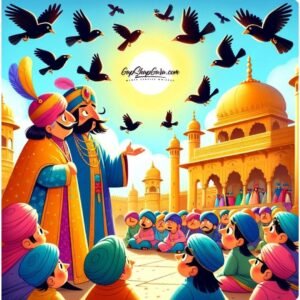
Birbal replied, “If someone finds more crows, they have invited their relatives from other cities. And if there are fewer crows, then some must have gone to visit their relatives elsewhere.” The court erupted in laughter, appreciating Birbal’s clever and witty response. Akbar, too, couldn’t help but smile at Birbal’s ingenious way of tackling the question. “But Birbal,” Akbar continued, “what if someone counts and finds a different number of crows?” “Oh, Your Majesty,” Birbal responded promptly, “that person should be praised for their dedication and patience in counting all the crows. And if my number is proven wrong, I shall accept my mistake.”
Emperor Akbar was impressed by Birbal’s quick thinking and ability to handle the situation with humour and intelligence. He realised that some questions in life do not have straightforward answers and that wisdom often lies in understanding the nature of the question itself. As the court session ended, the story of Birbal’s answer spread throughout the kingdom, bringing smiles and laughter to all who heard it. It was another example of how Birbal’s wit entertained and conveyed a deeper understanding of life’s complexities.
Moral: The story of “The Wise Answer” teaches us that not every question in life has a straightforward answer. Sometimes, wisdom is shown not in giving the exact answer but in understanding the nature of the question and responding in an intelligent and humorous manner. It also highlights the importance of wit and the ability to think quickly on one’s feet. Related: The Thirsty Crow Full Story With Moral For Kids In English
Akbar And Birbal Khichdi Story
In the heart of winter, Emperor Akbar and Birbal walked by the lake. Akbar observed the icy waters and questioned Birbal about the power of human determination and intelligence. “Birbal, do you think a man could stand in this freezing water all night for a reward?” he asked. Birbal believed in the resilience of humans and said, “Yes, Your Majesty. For the right incentive, a person could do it.” Intrigued, Akbar decided to test this. He announced that anyone who could stand in the lake all night would receive a handsome reward. A poor man, driven by necessity, took up the challenge. He stood in the freezing water all night, thinking about the reward that would change his life.
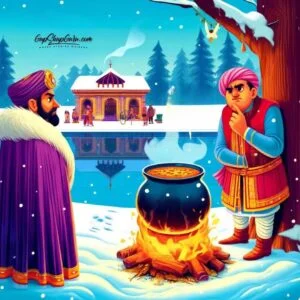
The next day, the man was brought before Akbar. But before giving the reward, Akbar asked how he had endured the cold. The man replied that he kept his eyes on a distant lamp post, which helped him stay focused and ignore the cold. Thinking this was a form of external warmth, Akbar refused to give the reward, declaring that the man had not completed the challenge solely based on his determination. The man was heartbroken. Birbal was dissatisfied with Akbar’s decision when he learned of this. Birbal devised a plan to teach Akbar a lesson about empathy and fairness.
A few days later, Birbal invited Akbar to his house for dinner. When Akbar arrived, he saw a pot of khichdi (a rice dish) being cooked on a fire set high above the pot. Akbar was puzzled and asked Birbal why the pot was so far from the fire. Birbal calmly replied, “I am cooking a special khichdi, Your Majesty. It will be cooked from the heat coming from afar, just like the poor man who received warmth from the distant lamp post.”
Akbar realized his mistake. He understood that the man had endured the cold not because of the distant lamppost but because of his hope for a reward. He admired Birbal’s clever way of explaining the situation without directly confronting him. Akbar generously rewarded the poor man and thanked Birbal for his valuable lesson. He acknowledged that true wisdom is in understanding and empathy, not just in the literal interpretation of words.
Moral: This story teaches us that hope and determination can help us endure even the most challenging situations. It also highlights the importance of empathy and fairness in leadership. True wisdom lies in understanding the deeper truth, not just the literal interpretation of words.
The Three Questions – Akbar And Birbal Short Story
One day, Emperor Akbar posed three questions to his courtiers, declaring that the one who could answer them most satisfactorily would be awarded a grand prize. The questions were: “What is the most precious thing in the world? Who is the most important person? And what is the most important job?” The courtiers were puzzled. They whispered among themselves, each trying to come up with the most impressive answers. However, none of their responses seemed to satisfy the emperor. Seeing the dilemma, Birbal stepped forward. “Your Majesty,” he began, “the most precious thing in the world is time. Time lost can never be regained, and it is the one thing that is valuable in every situation.”
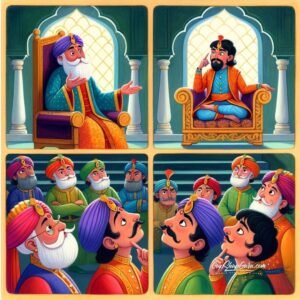
Akbar nodded thoughtfully and prompted Birbal to answer the second question. Birbal replied, “The most important person is the one you are with now. That is where your attention and actions are focused. Ignoring the person in front of you for someone else is both disrespectful and unwise.” The emperor, impressed by the depth of the answer, urged Birbal to respond to the final question. “The most important job,” said Birbal, “is to do good for others. There is no higher purpose than to serve and bring happiness to others.”
Akbar was delighted with Birbal’s answers. He praised Birbal for his wisdom and insight and declared him the grand prize winner. The courtiers applauded, acknowledging the depth and truth in Birbal’s words.
Moral: This story highlights the value of time, the importance of being present and attentive to those around us, and the noble purpose of serving others. It reminds us that wisdom often lies in understanding the fundamental truths of life.
The Missing Cows Story Of Akbar And Birbal In English With Moral
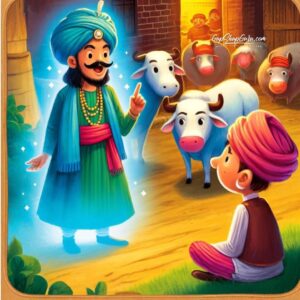
In Akbar’s kingdom, there was a sudden case of missing cows. The distressed farmers approached the emperor for help. Akbar asked Birbal to solve the mystery. Birbal visited the village and noticed a young shepherd looking suspicious. Birbal then announced that he could speak to animals and would ask the cows who took them when they returned. He whispered in the ears of the cows that had not been stolen. To everyone’s surprise, the missing cows returned to their sheds the next day. Birbal pointed to the young shepherd and said, “He returned them, fearing the cows would reveal his name.” The shepherd admitted his guilt and was forgiven on the condition that he would never steal again.
Moral: This story teaches the value of intelligence and psychology in solving problems. It also highlights the importance of compassion and giving second chances.
Akbar And Birbal Funny Stories – Birbal’s Journey to Heaven
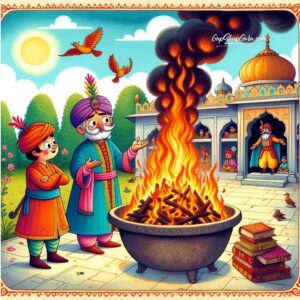
Once, a jealous courtier challenged Birbal, asking him to send someone to heaven and bring a message from a deceased relative. Birbal accepted and asked for a six-month preparation time. During this time, Birbal built a large fire pit. He asked the courtier to provide his most valuable possessions, as offerings were needed for the journey. The courtier, eager to win, complied. On the day of the journey, Birbal set the possessions on fire, declaring they were being sent to heaven. Later, he disguised himself and visited the courtier as the messenger from heaven, saying the relative was pleased but needed more offerings.
The courtier, realising he had been tricked, apologised for his folly. Akbar and the court were amused by Birbal’s clever ruse.
Moral: This story illustrates that greed and jealousy can cloud judgment and lead to folly. It also shows the power of wit in outsmarting deceit and malice.
Who were Akbar and Birbal?
Akbar was a great Mughal Emperor, and Birbal was one of his most trusted advisors, known for his wit and wisdom.
Are these stories true?
These stories are part of Indian folklore and likely blend historical characters and fictional tales.
What do these stories teach?
They teach moral lessons through wit, wisdom, and clever solutions to problems.
Can these Short Stories Of Akbar And Birbal be read to children of all ages?
Yes, these stories are suitable for children of all ages and provide valuable life lessons in an entertaining way.
Why are Akbar and Birbal stories so popular?
Their popularity lies in the clever and humorous way they convey life lessons, appealing to both children and adults.
Summary of Short Stories Of Akbar And Birbal
In the world of Akbar and Birbal, wisdom, wit, and moral values shine through each story. These Short Stories Of Akbar And Birbal, transcending time and culture, continue to fascinate and teach valuable lessons to children and adults alike. They remind us of the simplicity and depth of our folklore, enriching our lives with each reading. This concludes our collection of Short Stories Of Akbar And Birbal. Through their timeless appeal, we hope to instil in young readers the virtues of intelligence, empathy, and a good sense of humour.
